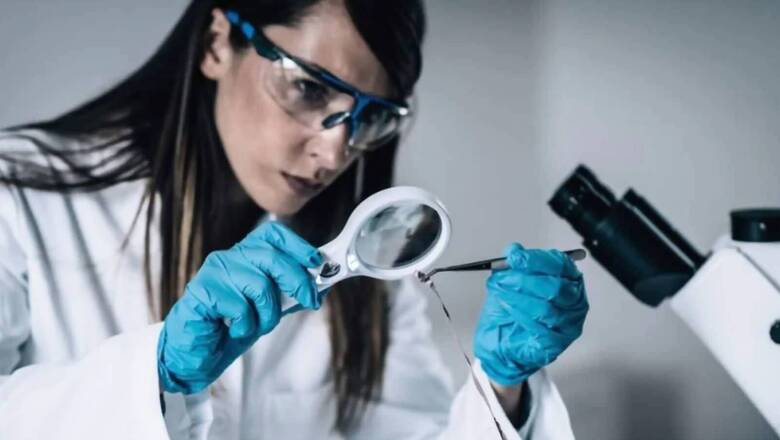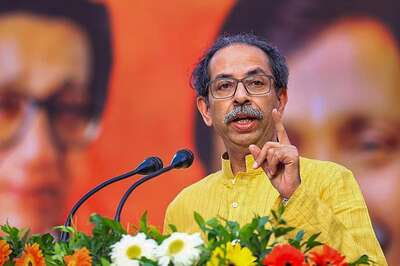
views
Deliverance of timely justice is the main goal of any judiciary or law enforcing agency. Forensic science works hand in hand with law enforcing agency and the judiciary towards achieving this goal. It is the application of scientific methods and techniques to a matter under investigation that ultimately leads to attribution and justice.
As a study, forensic science encompasses many branches of study that ranges from biology, physics, chemistry, psychology, criminology, victimology, crime scene management, criminal justice system, forensic medicine, questioned document & finger print examination, cyber forensics, forensic ballistics, anthropology, serology, DNA profiling, wild life and the likes.
Also read| Career Wise: Build a Career in Wellness Without Cracking NEET with Functional Nutrition
A forensic scientist will be able to apply various skill sets required to solve the puzzle of crime and help the judiciary arrive at attribution in a scientific manner.
An academic programmes in forensic science should cater to providing an insight into basic principles, theories, concepts, methods, techniques and skill set in various branches of study that enables an individual to collect, preserve and analyse evidences of all forms which in turn will provide the necessary details required for attribution.
FUTURE ASPECTS IN FORENSIC SCIENCE
Job prospects in forensic science can be in the government and private sectors. Government organisations like central/ state/ regional forensic science laboratories, Crime Bureau of Investigation (CBI), Crime Investigation Department (CID), narcotics, quality control bureau, police department (scene of crime officers), etc, hire graduates and post-graduates in forensic science.
Private investigation agencies, banks, software companies, hospitals, law firms, security service agencies, multi-national companies etc, also hire forensic graduates. There is also an increasing scope for start-ups in the field of forensic science. Forensic service offices can also be established where services can be offered to advocates and lawyers.
Research in the field of forensic science is the need of the hour. Innovations in techniques, methods and instrumentation is required to constantly improve the time taken for various aspects of forensic investigations. Easy access and easy handling of such sophisticated instruments at the scene of crime reduces the time lapse required in the analysis of evidences in the laboratory thereby reducing the time of trial and in turn attribution.
Scope for forensic scientists in India or any other country is never ending. There’s always a requirement for skilled scientists/ well trained professionals in the field. Well trained and informed teachers is yet another future aspect in the growth of forensic science as a field of study in India.
The salary package of a forensic scientist in India is between Rs 2 lakhs to Rs 8 lakhs.
JOB ROLE
The most common job role played by the graduate or post graduates in forensic science is that of a forensic scientist: A graduate / post-graduate suited for this job should be able to identify evidences (fingerprints, questioned documents, biological evidences, physical evidences, ballistic evidences, toxicological evidences, arson/ fire-based evidences, cyber/ digital evidences) at the scene of crime, label, package and analyse them with the available tools, analytical instruments etc.
Based on the years of experience, an individual may be inducted into the organisation as an analyst going onto becoming a senior scientist. As an analyst, the key role is to assist the scientist in the laboratory. As a senior scientist, the individual also gets to make inferences from the analyses, write reports and present the same in the court of law as expert witness. Based on the expertise, we can identify different types of forensic scientist viz blood splatter analyst, forensic psychologist, forensic anthropologist, forensic toxicologist and the like.
Scene of crime officers — As a scene of crime officer, the job role will be to first and foremost secure the crime scene and ensure its management which involves identification, labelling and packaging of evidences. They are the first respondents to the crime scene along side the police and will ensure that the crime scene is not contaminated or violated.
Job roles in cyber forensics — Cyber security analyst, cyber security consultant, cyber forensic analyst, incident response specialist are the roles specific to the field of cyber forensic. The job roles include responsibilities like analysing threat to digital data, securing the digital data, handling cyber forensic incidents to mention a few.
— Written by Dr Reena Susan Philip, head and professor, department of forensic science, JAIN (Deemed-to-be University)
Explore other career options with us: Career in Sound Designing, Sound Engineering | Sustainability Professional | Yoga & Naturopathy | Software Testing | Medical Coding | Cloud Developer & Cloud Architect | 3D Technology | Garment Technologist |AI & Robotics |Fashion Designing |Supply Chain Finance |Animal Welfare | Public Relations | Gaming Industry | Functional Nutrition | Market Research Analyst |
Read all the Latest Education News here




















Comments
0 comment